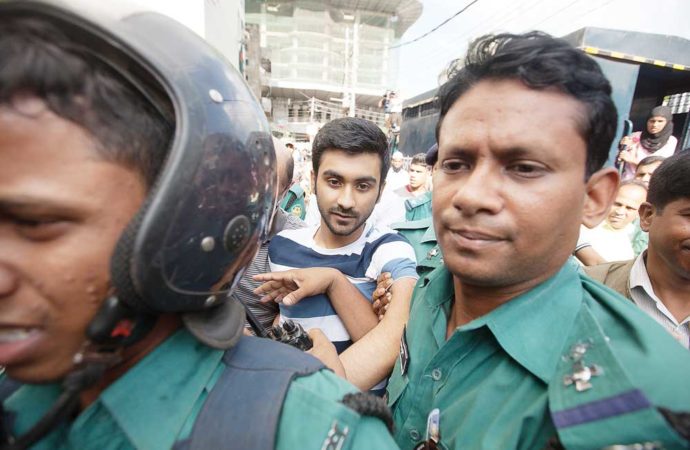We have become as bad as those who stereotype, judge, and oppress us
So, when I was in school, I was sitting for an English exam. It was fairly easy, but with one question, I got stuck. I had to write the past tense forms of certain words and when it came to “think” I couldn’t, for the life of me, remember what it was. So, sitting down, I thought and I thought and I thought, and finally, I wrote: “Thunk.”
Variations of this joke exist, and I have merely paraphrased what I remember of the original. And, much like the protagonist, who knows the answer and yet, chooses not to see it sitting right under his nose, or his mind, so to speak, we, perhaps, do not wish to see the truth even when it’s staring right at us in the face.
Not our fault, though, the Bangladeshi people. We are a suspicious bunch, if you pardon my generalisations. I only take this liberty because, we, as a collective, have chosen to generalise in the same way people have done against us: Without thought (thunk? I forget), rationale, patience, and time.
When pictures of Tahmid came out holding a gun, whatever favour or goodwill he had garnered either through the Free Tahmid Facebook page or via general consensus and word of mouth, vanished — and the entire country’s opinion shifted. It is almost as if a nation has, collectively, forgotten what its own government and law enforcement agencies are capable of. Not to mention terrorists.
Terrorists represent a demography of people without a specific age, religion, caste, race, or creed and are capable of the worst things imaginable. They could, for example, be a university lecturer in his mid-40s who knowingly took his family, which included two young children, to a bloodbath. Or a university sophomore who willingly brought two of his friends, pretending all is fine and dandy, to an elite upper class restaurant, knowing full well that it may very well lead to their deaths.
If there is the slightest possibility of innocence, we must hold on to that string with all the unified might we can. We must, no matter how bad things get, understand that the right of the individual to be tried, fairly and with transparency, is crucial to any democratic process
They could also be clever enough, or at least puppets for a mastermind who was clever enough, to leave a trace of doubt amongst the general populace regarding the innocence and involvement of their victims, by forcing one of them to hold a gun and another to pretend like he’s the ringleader, and go to the roof for absolutely no logical reason, in clear view of snipers, and act as if they’re all in on this together.
It is only human to be suspicious. And seeing pictures like those, anyone would wonder: Hey, that’s kind of dodgy. Same old questions: Why is Tahmid holding the gun like that? Why does Hasnat look like the leader? Why is Tahmid not shooting Rohan and getting straight out of dodge? Et cetera.
These are questions which have logical explanations (see above) or see inside yourself to try and find out. There are plenty of reasons each of them was acting the way they were. A body language expert has said that Tahmid was acting submissive. Most of us were unwilling to buy that. That is not a proper science, of course, and that is only understandable.
What is not, however, is that, for a generation of people who have lived through governments bad and worse, corrupt and more corrupt, unjust and in flagrant violation of its own laws, how are we so easily persuaded as to believe that there isn’t something amiss?
Of course, they wouldn’t arrest Tahmid and Hasnat without reason (and I must reiterate: I do not think that they are uninvolved and innocent; I do not know). But why must that reason be so clear cut as to be the fact that they were involved; in fact, why must we, without knowing anything really, jump to a conclusion at all.
More than a month has passed since the Holey Artisan attack, and I feel as clueless as the day it happened. In fact, I’ve become burdened with more questions. How can I, with such doubts, with so many things I just do not know, still make any sort of claim with any sort of conviction?
How can you begin any sentence without the self-doubting “I think,” “I believe,” or “maybe;” and now that Tahmid has been arrested-but-not-arrested, there is even less one can say. How much longer will they be “interrogated” and “held” before this reaches its fateful climax?
The trial of Tahmid and Hasnat may very well play out in the media, with half-truths and conjectures. But, if there is the slightest possibility of innocence, we must hold on to that string with all the unified might we can. We must, no matter how bad things get, understand that the right of the individual to be tried, fairly and with transparency, is crucial to any democratic process.
For all we know, this government has taken an individual and ruined his future. Imagine that: An innocent boy, with no intentions of harm or violence, goes to prison, his most crucial years spent in a prison cell, his life perpetually marred by stigma. Could we live with that?
Or are we okay with that, as long as there’s the minutest possibility that he was connected? What does that say about us, if anything at all, anymore? That we are not united in faith anymore, that we’re losing whatever collective identity we once boasted, that we are just as worse as those who stereotype us, judge us, oppress us.
After all of this, who’d have thunk it?
SN Rasul is a Sub-Editor at the Dhaka Tribune. Follow him @snrasul.










